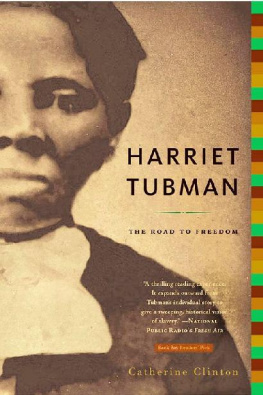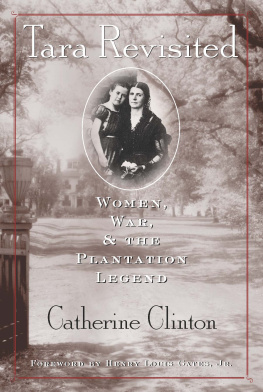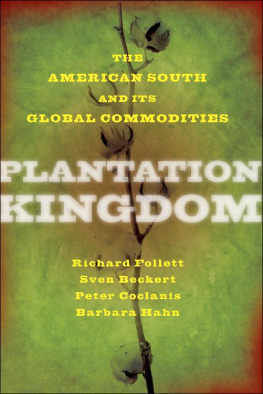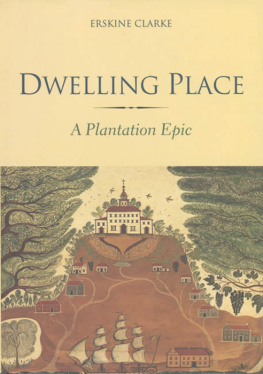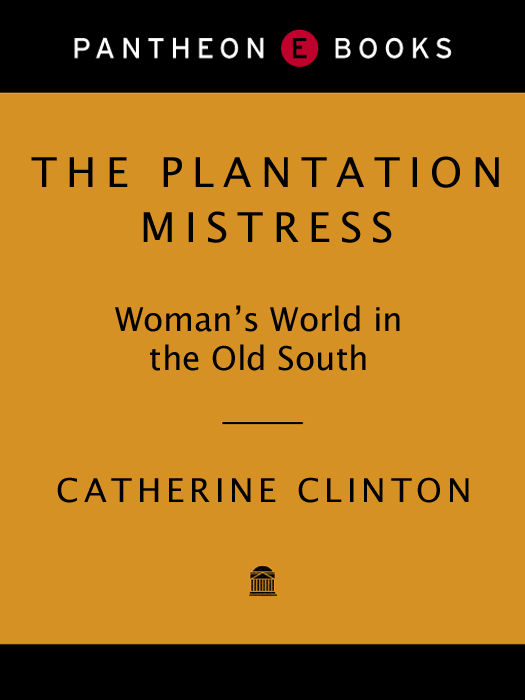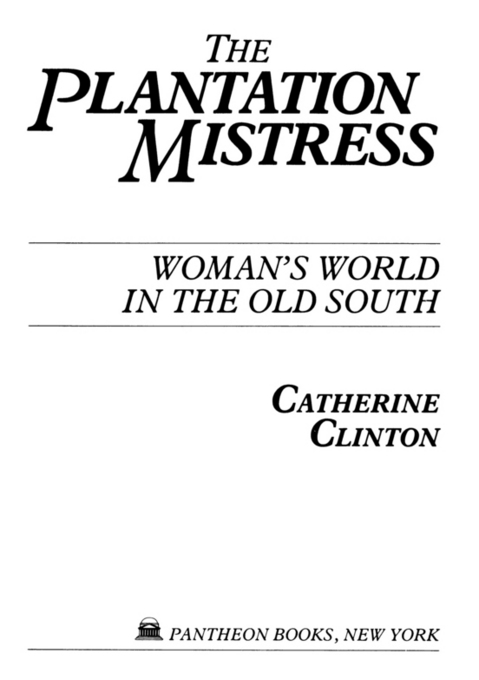Copyright 1982 by Catherine Clinton
All rights reserved under International and Pan-American Copyright Conventions. Published in the United States by Pantheon Books, a division of Random House, Inc., New York, and simultaneously in Canada by Random House of Canada Limited, Toronto. Hardcover edition published by Pantheon Books, a division of Random House, Inc., in 1982.
Grateful acknowledgment is made to the following for permission to reprint previously published material:
University of Missouri Press: Excerpts from The Family Letters of Thomas Jefferson, edited by Edwin Betts and James Adam Bear, Jr. Copyright 1966 by The Curators of the University of Missouri. Reprinted by permission of The University of Missouri Press.
University of North Carolina Press: Verse from True Tales of the South at War, 186165, edited by Clarence Poe. Copyright 1961 by The University of North Carolina Press. Reprinted by permission of The University of North Carolina Press.
Currier and Ives lithograph, 1855, courtesy of the Museum of the City of New York.
Library of Congress Cataloging in Publication Data
Clinton, Catherine, 1952-The plantation mistress.
1. MistressesSouthern States. 2. Plantation lifeSouthern States. 3. Sex customsSouthern States. I. Title.
HQ806.C53 305.567 82-3549
eISBN: 978-0-307-77248-0
v3.1
T HIS BOOK IS DEDICATED
TO
CLAUDENE CLINTON
BOBBIE SIMMS
BARBARA LEVY UHLMANN
with appreciation
for their love,
encouragement,
and inspiration,
which made this volume possible.
B ut the effect of her being on those around her was incalculably diffusive: for the growing good of the world is partly dependent on unhistoric acts; and that things are not so ill with you and me as they might have been, is half owing to the number who lived faithfully a hidden life, and rest in unvisited tombs.
George Eliot, Middlemarch
CONTENTS
PREFACE
HIDDEN LIVES
CHAPTER I
WOMEN IN THE LAND OF COTTON
CHAPTER II
SLAVE OF SLAVES
CHAPTER III
CIRCLE OF KIN
CHAPTER IV
THE DAY TO FIX MY FATE
CHAPTER V
THE MORAL BIND
CHAPTER VI
THE FALLEN WOMAN
CHAPTER VII
EQUALLY THEIR DUE
CHAPTER VIII
PRECIOUS AND PRECARIOUS IN BODY AND SOUL
CHAPTER IX
EVERY WOMAN WAS AN ISLAND
CHAPTER X
THE CURSE OF SLAVERY
CHAPTER XI
THE SEXUAL DYNAMICS OF SLAVERY
CHAPTER XII
FOUCAULT MEETS MANDINGO
PREFACE
HIDDEN LIVES
T he pageantry of days gone bychivalrous cavaliers and belles in hoop skirtslives in memory for many Southerners. The popular celebration of plantation legend, the Lost Cause, and the romance of Confederate lore (boy generals and seductive Rebel spies) spin a web of wonder, even today. This reverence for the Old South reveals an ironic obsession with glory as well as history. Southerners are as concerned with what might have been as with what was. The canvas of the southern past is liberally splashed with folklore, embellished by exaggeration, highlighted with pomp and spectacle. By redrawing history, in fact, the vanquished South defies defeat. Repeated and loving resurrection of the Old Souths glory renovates the plantation past to a splendor that far outshines its foundation in reality.
Despite this elaborate re-examination and renewal, aspects of that past remain obscure. In this study, I focus on a character both overlaid by romantic mythologizing and considerably shortchanged by traditional historical literaturethe plantation mistress. By looking through the prism of her actual experience, we transform our vision of the Old South and, correspondingly, our understanding of the nature of slavery and sex in the American past.
This book was written first of all to tell a story. Although the final study remains continuously aware of theoretical issues, my research took me from archives to historic homes and ante-bellum plantation sites. While I cannot hope to reproduce all that I absorbed of texture as well as texts, this work tries to reflect the range and intensity of those myriad sources.
Concerned about the meaning of race in American history, I began with slavery. When I began to absorb as much literature as I could on the subject, I was overwhelmed by both the quality and the quantity of work on the topic. I greedily devoured the work of the great men of slave scholarship who reigned during my undergraduate yearsKenneth Stampp, Stanley Elkins, Winthrop Jordan, and Eugene Genoveseand was privileged to study with both Orlando Patterson and C. L. R. James during my years at Harvard. Yet I was most bedazzled by the rich primary literature to which I was exposed: Frederick Law Olmsteds accounts of travels in the Old South, Robert Manson Myers editions of the Jones family correspondence (beginning with The Children of Pride in 1972), and finally the diary of Mary Boykin Chesnut, which has recently received some measure of the attention it deserves courtesy of C. Vann Woodwards new edition of her work. Although my interest in slavery increased over the years, my disenchantment with the secondary literature also grew. Where were the women?
This was a question that also grew out of the intellectual ferment of the sixties. After I had plowed through scores of volumes that maintained utter silence about white women in the slave South, two very valuable and essential works rescued me: Julia Cherry Spruills Life and Work of Women in the Southern Colonies (1938) and especially Anne Firor Scotts The Southern Lady: From Pedestal to Politics, 18301930 (1970). These two books stimulated my curiosity concerning plantation women and set me searching through the library stacks and probing the archives, even as an undergraduate.
Five years later, as I prepared to launch a doctoral dissertation, I determined to do justice to the massive and relatively unexplored documentary sources. Although I wanted to study all women throughout the southern states during the entire ante-bellum era, I was soon forced to narrow my focus. It is the aim of this work to provide a female counterpoint to the vast literature on the southern planter. In setting about to find the plantation mistress, I focused on women in residence on plantations with twenty slaves or more. Thus the majority of my subjects are elite, although a number of women who did not meet this economic or residential standard have made their way into the book. My study includes the seven seaboard states of the plantation South (excluding Florida): Virginia, North Carolina, South Carolina, Georgia, Alabama, Mississippi, and Louisiana. After surveying the large body of manuscript material available on the planter class for this region, I narrowed my chronological sights to the period 17801835.
This time frame is neither random nor arbitrary, for it serves scholarly as well as intellectual functions. Not only does it fit neatly between those examined in Spruills and Scotts works, but it offers a southern counterpoint to Nancy Cotts recent study, The Bonds of Womanhood: Womans Sphere in New England, 17801835. Furthermore, this periodknown in historical circles as the early American Republic or new nation erawas not only an epoch of dynamic transformation for the country as a whole but perhaps the single most significant developmental stage in the history of the American South.


